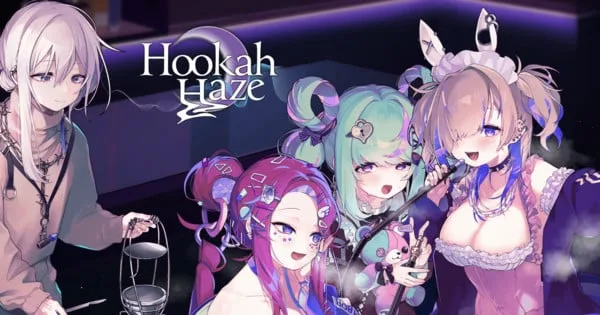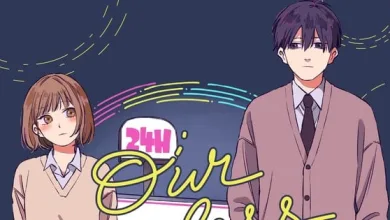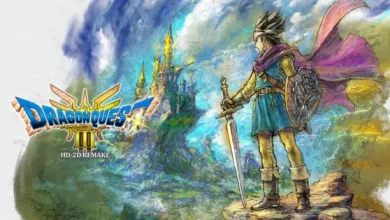Hookah Haze Game Review – Game Review

Not to sound judgmental, but some of y’all out there are really into the aesthetic of anime girls blowing clouds of smoke. If you number among them, I have good news! Hookah Haze is a game about watching anime girls exhale billowing clouds of smoke. Based on my social media feeds, that alone should be enough to draw in a not-insignificant contingent of fans. I’m looking at you, fellow ANN reviewer Steve Jones.
For the rest of us, Hookah Haze comes across as a bit of a lesser copycat of VA-11 Hall-A, the acclaimed visual novel/adventure game about bartending in a cyberpunk future. While it takes place in modern-day Akihabara, the aesthetic of dim lighting, pink/cyan neon lighting, and costume design that would look at home at a rave gives it a similar “cozy cyberpunk” sensibility. The gameplay is simple, with some minigames for mixing shisha to make different flavors and changing out the coals to get the smoke at just the right strength to break up the visual novel dialogue.
What makes it lesser than its predecessor and a fairly forgettable, if pleasant, game overall is how superficial most of it is. You play as Tohru, a twenty-something who has spent most of their life suffering from an unspecified debilitating illness. Your latest attempt at treatment has failed, and you’ve decided to move into palliative care instead of trying the last remaining option. Your doctor recommends you try Last Wish, a program for terminally ill patients to get to live out one final fantasy before passing on. Your wish is a bit more abstract than most: you want to form connections with others, something that has always been difficult due to your illness. Your doctor suggests using your interests, hookah and aquariums, and sets you up with a shop in Akihabara. They also give you enough painkillers to last two weeks so that you can function well enough to run a business.
It doesn’t take long before customers start showing up, and you spend two weeks getting to know your regulars. These regulars are three girls: Amu, an Akihabara maid who is as spoiled as she is sweet; Kokoro, whose cheerfulness masks trauma and deep sadness; and Kurumi, a doll designer who is as obsessed with nuts as she is nutty. They chat over shisha, getting to know one another as well as Tohru. As is usually the case in these sorts of games, you grow steadily closer to each one as they slowly open up about their problems, even as Tohru remains reticent about their own.
The problem is, two weeks just isn’t a very long time. It stretches credibility that the characters would develop such deep bonds and get to know one another’s issues in such a brief period. I’m not saying you can’t sense a kinship with people right away, but the structure is that Tohru not only hears about their issues but helps them start taking steps toward resolving them. The result is that everything feels compressed and shallow, starting from a place of archetypes to make the characters feel familiar rather than building them from the ground up. Kokoro acts peppy to hide her insomnia and psychological wounds? Why, you don’t say! The writing is agreeable enough, but combined with a short run-time – it’s possible to do all the routes in an afternoon – the surface-level character writing makes it so the story’s meditations on mortality have only a slight impact.
The gameplay is quite unexciting as well. It’s a visual novel first and foremost, so I don’t have high expectations beyond clicking to advance the dialogue and making the occasional choice, but it’s frustrating how little the minigames matter. And when I say they matter little, what I really mean is they don’t matter at all. Every day, your customers let you know what kind of blend they want, but whether or not you mix something they like has no bearing on the plot. Same with resetting the coals, which happens in the middle of each visit; you could set it so hot they scald their throats and they would keep showing up.
The only player choices that make any kind of difference are what blends to set as the daily special, which determines who shows up; and at the end of each route, whether to get the good or bad ending. Note how I phrased that – it’s blindingly obvious which choice is correct, whether you’re thinking about what the right thing to do or say is, or you notice that the “good” choice is always on the left and the “bad” choice is always on the right.
But I get it – the point isn’t a challenge, it’s vibes. And I must confess, Hookah Haze‘s vibes are impeccable. The moe-style character designs aren’t my speed, but the two-dimensional pixel art is lovely. While I’ve never been a smoker, there’s definitely a certain satisfaction in watching the characters take a long, slow inhale from their pipe and blow out the smoke with a faraway look in their eyes… I’d be lying if I said that I didn’t consider wandering over to the hookah bar two blocks away once or twice. There’s a programmable playlist of low-fi beats, but with one big downside: songs will restart if a new scene comes up in the middle of the track, but the tracks are longer than most scenes. After manually skipping to the next track a few times, I turned off the music altogether and just enjoyed the rain sounds that make up the ambient background noise.
Hookah Haze was a perfectly pleasant way to spend an afternoon, but with other games that do similar things but better out there, I’m not sure I can really recommend this. Well, unless you’re one of those perverts (I say with affection) that loves anime girls smoking. In that case, chase your bliss.
Source link
#Hookah #Haze #Game #Review #Game #Review


